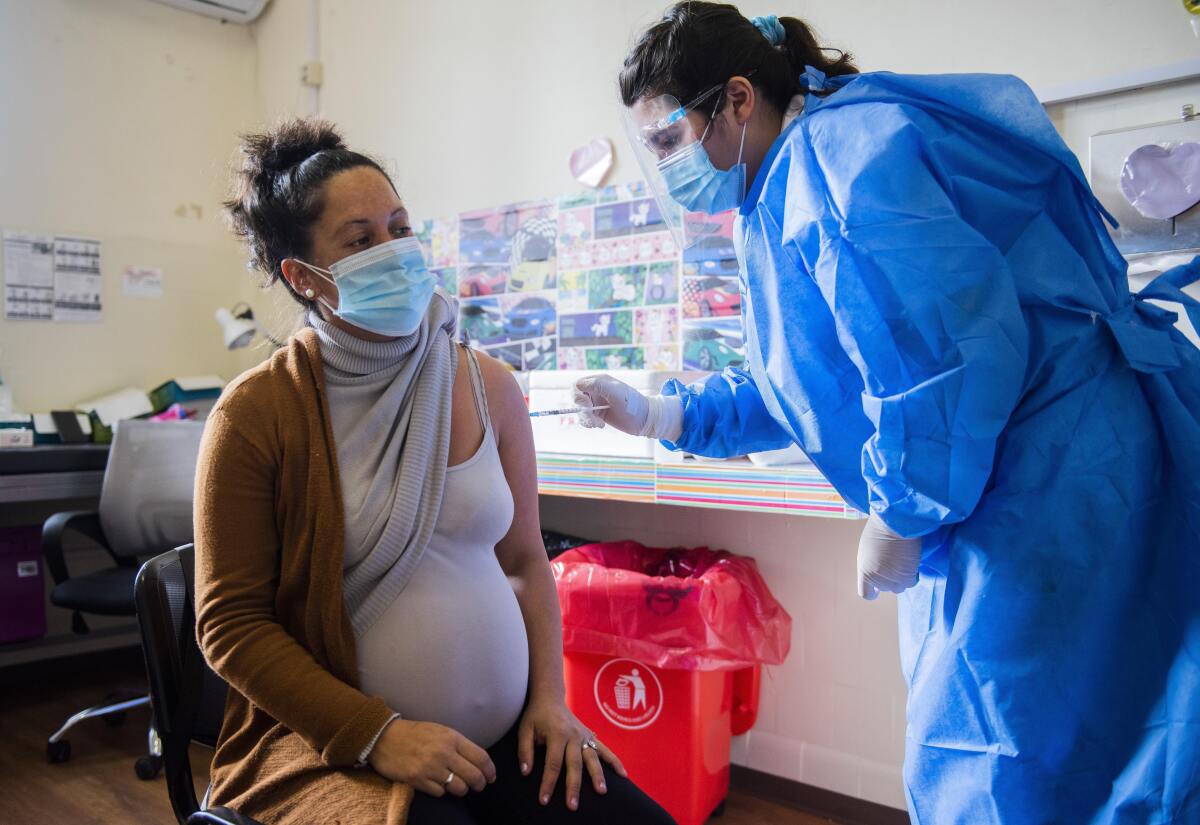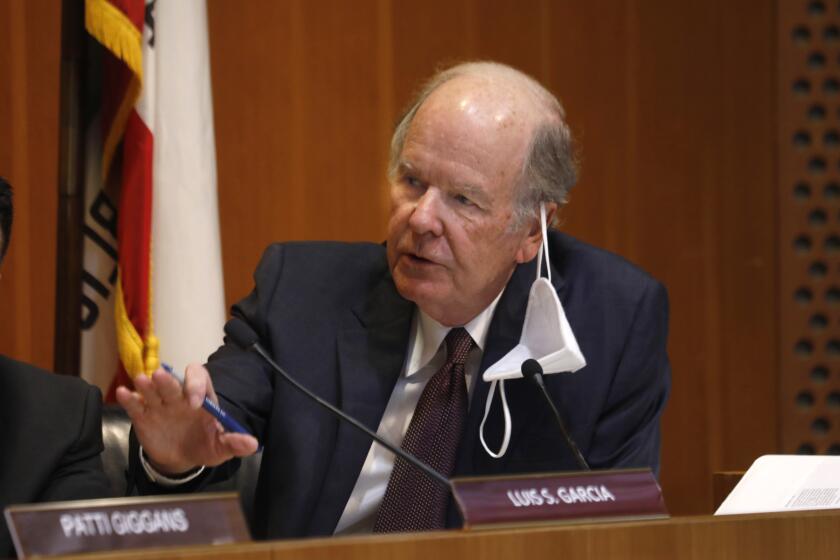Why our ‘pandemic of the unvaccinated’ includes so many who are pregnant

- Share via
This is the Aug, 30, 2021, edition of the 8 to 3 newsletter about school, kids and parenting. Like what you’re reading? Sign up to get it in your inbox every Monday.
I recently read a jaw-dropping statistic.
Just 23% of pregnant people are vaccinated against COVID-19. That’s less than half the vaccination rate for adults in the U.S. Twenty-three percent would be worrying enough if those who are pregnant had the same baseline risk of severe disease and death as the other relatively young, relatively healthy people currently filling up hospitals.
But we’ve known for more than a year now that they don’t.
“Pregnancy makes people sicker when they get COVID,” said Dr. Christina Han, a maternal fetal medicine specialist at UCLA, who has spent much of this summer treating pregnant COVID-19 patients. “Unfortunately, ICUs are becoming very comfortable with pregnant women in their units.”
Pregnancy suppresses the immune system — if it didn’t, the fetus would be attacked as a parasite. We’ve known for a long time that this process makes COVID-19 more dangerous in pregnancy, which is why California prioritized pregnant people in its high-risk vaccination tier in March. Long before the Delta variant, we knew that pregnant people who caught COVID-19 were more likely to be hospitalized, more likely to land in the ICU, more likely to need mechanical ventilation and ECMO, and more likely to die than those who were not pregnant at the time of infection.
We now also know they’re much more likely to lose their pregnancies, or to deliver extremely preterm. Emergency C-sections are now increasingly common in adult ICUs. Their neonatal counterparts are full of micro-preemies whose mothers may never get to meet them.
“We are constantly trying to walk that line, pushing a pregnancy for fetal benefit,” Han said. “We never know if we deliver right now, is it going to help improve her lung outcomes, or are we going to unnecessarily put a fetus at risk.”
There’s one more thing we know about these patients: Almost all of them are unvaccinated.
I know, I know — you’re fresh out of empathy for vaccine refusers. And listen, I hear you. It’s torture sending your too-young-to-vaccinate kid back to school in the midst of an outbreak you didn’t cause and can’t control. It sucks.
But if you’re reading this newsletter, it’s likely because you or a partner has been pregnant before. And I’m asking you to remember what that felt like — all the rules, the anxieties, the Zen koan non-answers your doctor gave to your questions. I’m asking you to remember that we have the highest rate of maternal and infant death in the developed world, and yet we’re the only developed country where pregnant women are instructed to cut coffee and abstain from alcohol, where women seeking abortion care are yanked off their antidepressants over largely unfounded fears of risk to a pregnancy that’s about to be terminated. We prosecute women who miscarry, or who give birth with drugs in their system; we threaten to take custody from mothers who smoke pot in pregnancy, even in states where pot is legal.
So how were pregnant people supposed to make an informed decision to be vaccinated when the American College of Obstetrics and Gynecology and the Centers for Disease Control and Prevention only endorsed the Pfizer vaccine for use in pregnancy this month?
“There were so many discussions to find what the appropriate time was,” Han told me when I asked her about the delay. “We wanted to make sure that we had the data in our hands to prove that there was no risk, even though we knew there was not going to be that outcome.”
Meanwhile, with no clear endorsement from the medical community and anti-vax lies overtaking the mommyverse via Instagram, Reddit and Facebook, thousands of expectant parents decided to wait — either until they delivered, or until they reached the third trimester.
“I obviously wanted to get the vaccines, but not when the baby’s so little,” Seal Beach mom Kathryn Pederson told me when we spoke on the phone earlier this month. “There was no information from the CDC. I’m not eating spicy tuna, so am I going to put a vaccine in my body that I don’t know much about?”
She was sheltering at home, not taking risks. Her husband, parents and all her close contacts were vaccinated, and they were strict about masks. Plus, she’d always been healthy.
“You think, ‘I’m so strong because I’m growing another person,’” she said. “Literally the only time I’d been to a hospital was to give birth to my [older] son.”
Then, at 24 weeks — four weeks shy of her third trimester, when she’d planned to get vaccinated — Pederson caught the coronavirus. By 26 weeks, she was intubated. When she didn’t improve, doctors at UCLA put her on ECMO, the last hope for patients with the most severe disease.
“I thought I was going to die,” Pederson said. “I’m working with a lot of therapists trying to process it.”
Today, Pederson feels extremely lucky: She recovered after a week and a half on ECMO, and is now rehabbing at home, weaning off oxygen.
She also feels extremely lucky to still be pregnant. Again, if you’ve ever been pregnant, or been close to someone who has, you know what a big difference there is between 26 or 28 weeks compared with 32 or 34. If you don’t know, or can’t remember, there are NICU nurses on Reddit whose recent threads will evoke this distinction in detail.
Outcomes like these are the main reason 77% of pregnant people still aren’t vaccinated. They’re also the reason obstetricians struggled to get their patients to take TDaP boosters pre-COVID. The overwhelming fear of any fetal harm — stoked by blanket bans on benign substances like lattes and lunch meat and Lexapro, and enforced through our punitive treatment of pregnant people — makes it uniquely difficult for this population to choose a clear benefit over an unfounded risk.
“It’s the whole idea of mothers making sacrifices,” Han explained. “We feel like we can sacrifice ourselves and therefore not give a medication to our body and our fetuses that we maybe don’t need.”
This is why so many pregnant friends of mine won’t take Tylenol, even though it’s endorsed by doctors and considered extremely safe. It feels right to deprive ourselves, because that’s what motherhood so often requires, and what our culture upholds as virtuous.
“But it needs to be thought of the other way,” the obstetrician insisted. “You’re making a sacrifice to get this medication so you can keep both of you safe.”
What’s scarier, COVID-19 or mountain lions?
What do schools do when kids do test positive for coronavirus? My colleagues Howard Blume, Amina Khan, Colleen Shalby and Karen Garcia have some answers.
The Times’ Ron-Gong Lin II reported on every parents’ nightmare: the case of a single, unvaccinated teacher in a Northern California elementary school who infected a dozen students with the coronavirus. The students in turn infected four of their parents. Also troubling: recent coronavirus outbreaks in Los Angeles County involving members of high school cheerleading and dance squads.
Of course, COVID-19 isn’t parents’ only nightmare. Consider the case of a 5-year-old who was attacked by a mountain lion in the Santa Monica Mountains. The Times’ Doug Smith says the mom in this case saved her son’s life through quick thinking — or maybe just quick reactions.
Enjoying this newsletter?
Consider forwarding it to a friend, and support our journalism by becoming a subscriber.
Did you get this newsletter forwarded to you? Sign up here to get it in your inbox every week.
More news from the world of parenting
A hot topic this week is how schools can get their kids back up to speed after the pandemic’s learning setbacks. Hechinger Report
Watch one Elk Grove elementary teacher talk about how she’ll catch students up. Sacramento Bee
Here’s one factor making it harder: In a recent survey, students across California reported a marked decline in their “mental wellness.” LAist
You shouldn’t blame Gov. Gavin Newsom for not opening schools sooner — at least, not in the opinion of one writer. San Francisco Chronicle
Here are tips for buying the best face masks for kids. KQED Mind/Shift
Children ask the darndest things. Like: “Who are Taliban?” “What is an insurrection?” “Who is George Floyd?” A Washington, D.C., kindergarten teacher writes about some of the queries she’s fielded — and how she responds. Chalkbeat
I want to hear from you.
Have feedback? Ideas? Questions? Story tips? Email me. And keep in touch on Twitter.
Sign up for Essential California
The most important California stories and recommendations in your inbox every morning.
You may occasionally receive promotional content from the Los Angeles Times.







